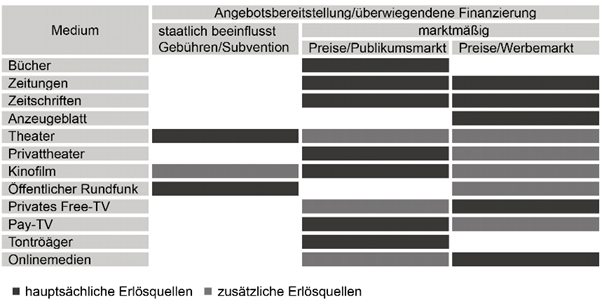Media Producers as a Company
Disclaimer: No claim to completeness is made for any of the statements and assumptions contained herein. This wiki, like the project as a whole, is a "work in progress". We warmly welcome constructive criticism and content-related information or additions in order to continuously improve our work and thus the COMPPRESS project. We are happy to receive your feedback via info@comppress.org or via Github.
In the dual media system, public broadcasting (including internet presence) and private media producers share the media market. While public service broadcasting is largely financed by state-issued license fees and to a small extent from advertising income, all private-sector media companies have to sell their media products on the market at a profit.
Traditional print media are financed through a mixed model of sales revenues (subscriptions and individual sales) and advertising income. Up until the year 2000, two-thirds of publishing house revenues were generated through advertising. Since the extreme growth in the importance of the Internet, however, the newsprint advertising industry has greatly declined, as the Internet offers a superior—and above all economically more attractive—platform for advertisers. Nevertheless, although the use of online content today is for the most part free of charge, online journalism is characterised by advertising income (70-84% of the online news content is financed by advertisement placement).1 Other online payment methods, albeit in a significantly smaller proportion, are, for example, paywalls at various levels, donations, e-papers / online subscriptions, and crowdfunding.
The ownership structure of media providers is also shaped by the need to produce economically. Media producers are usually organised as publishers who combine several providers and other subcontractors under media companies. Many media companies are also grouped together as large, diverse and sometimes international corporations. Bertelsmann, for example, is the largest media company in Germany and the 9th largest media company in the world, with annual sales of over 16 billion euros. The company operates internationally and owns TV stations, the Penguin Randomhouse publishing house, magazine brands such as STERN and BRIGITTE, the music company BMG, and even the service provider Arvato. In Germany, Bertelsmann is the owner of the RTL Group, with a share of around 25% in the media market. Bertelsmann also owns Gruner + Jahr GmbH, the second largest publisher in Europe. 2
Sources of Income in the Media Market 20053

Sources:
1. bdzv 2020: https://www.bdzv.de/alle-themen/marktdaten/zur-wirtschaftlichen-lage-der-deutschen-zeitungen-2021
2. CeMIL 2020: https://www.polsoz.fu-berlin.de/kommwiss/institut/cemil/schule/schule_inhaltselemente/12_mediensystem/a_mediensystem.html
3. Haselwander, Peter (2015): Alternative Medienfinanzierung über Crowdfunding. Magisterarbeit, Universität Wien. Fakultät für Sozialwissenschaften. Abgerufen unter http://othes.univie.ac.at/39046/
